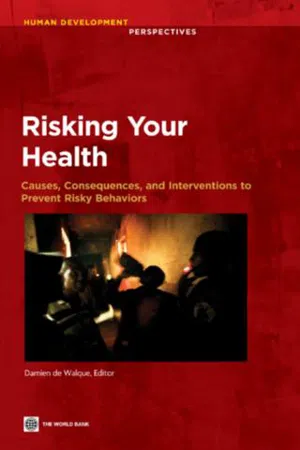
Risking Your Health
Causes, Consequences, and Interventions to Prevent Risky Behaviors
- English
- PDF
- Available on iOS & Android
Risking Your Health
Causes, Consequences, and Interventions to Prevent Risky Behaviors
About This Book
Behaviors that pose risks for an individual's health and that also represent important threats for public health, such as drug use, smoking, alcohol, unhealthy eating causing obesity, and unsafe sex, are highly prevalent in low income countries, even though they are traditionally associated with richer countries. Individual choices are an important part of the risky behaviors. Risking Your Health: Causes, Consequences, and Interventions to Prevent Risky Behaviors explore how those choices are formed and what are their consequences. Why do people engage in risky behaviors? Many different explanations have been proposed by psychology, sociology, economics or public health. One trait common to all these behaviors is that there is a disconnect – a function of both delay and uncertainty - between the pleasure or satisfaction provided by them and their consequences. Another characteristic of risky behaviors is that they rarely occur in isolation. Peer-pressure, parental influences, networks and social norms often play an important role in initiating, continuing, or quitting those behaviors. Even if they might often be the first to suffer, the consequences of risky behaviors are also rarely limited to the individuals engaging in them. In certain cases, such as second-hand smoking or HIV transmission, the link is direct. In other cases, the link is less direct but not necessarily less real: the long term health consequences of many of these behaviors are costly to treat and could stretch households' finances and worsen poverty. Finally, these risky behaviors have consequences for society as a whole since they often trigger a non-trivial amount of public health expenditures and lead to declines in aggregate productivity through premature death and morbidity. Changing behaviors is tricky -- public health interventions via legislation with strong enforcement mechanisms can be more effective than simple communication campaigns informing consumers about the risks associated with certain behaviors, since translating knowledge into concrete changes in behavior seems to be hard to achieve. Economic mechanisms such as taxes (especially on alcohol and tobacco products), subsidies (such as free condoms), and conditional/unconditional cash transfers are also used to reduce risky behaviors (for example in HIV prevention). Of great interest to policy makers, academics and practitioners, this book assesses the efficiency of those interventions designed to reduce the prevalence of behaviors that endanger health.
Frequently asked questions
Information
Table of contents
- Cover
- Contents
- Foreword
- Acknowledgments
- About the Authors
- Abbreviations
- Introduction
- Chapter 1: Overview of the Prevalence and Trends of Risky Behaviors in the Developing World
- Chapter 2: Determinants of Risky Behavior
- Chapter 3: The Consequences of Risky Behaviors
- Chapter 4: Targeting Risky Behaviors Using Nonprice Interventions—Legislation, Information, and Education
- Chapter 5: Using Economic Mechanisms to Reduce Risky Behaviors: Tax Policies and Other Incentives
- Chapter 6: Conclusions
- Boxes
- Figures
- Maps
- Tables